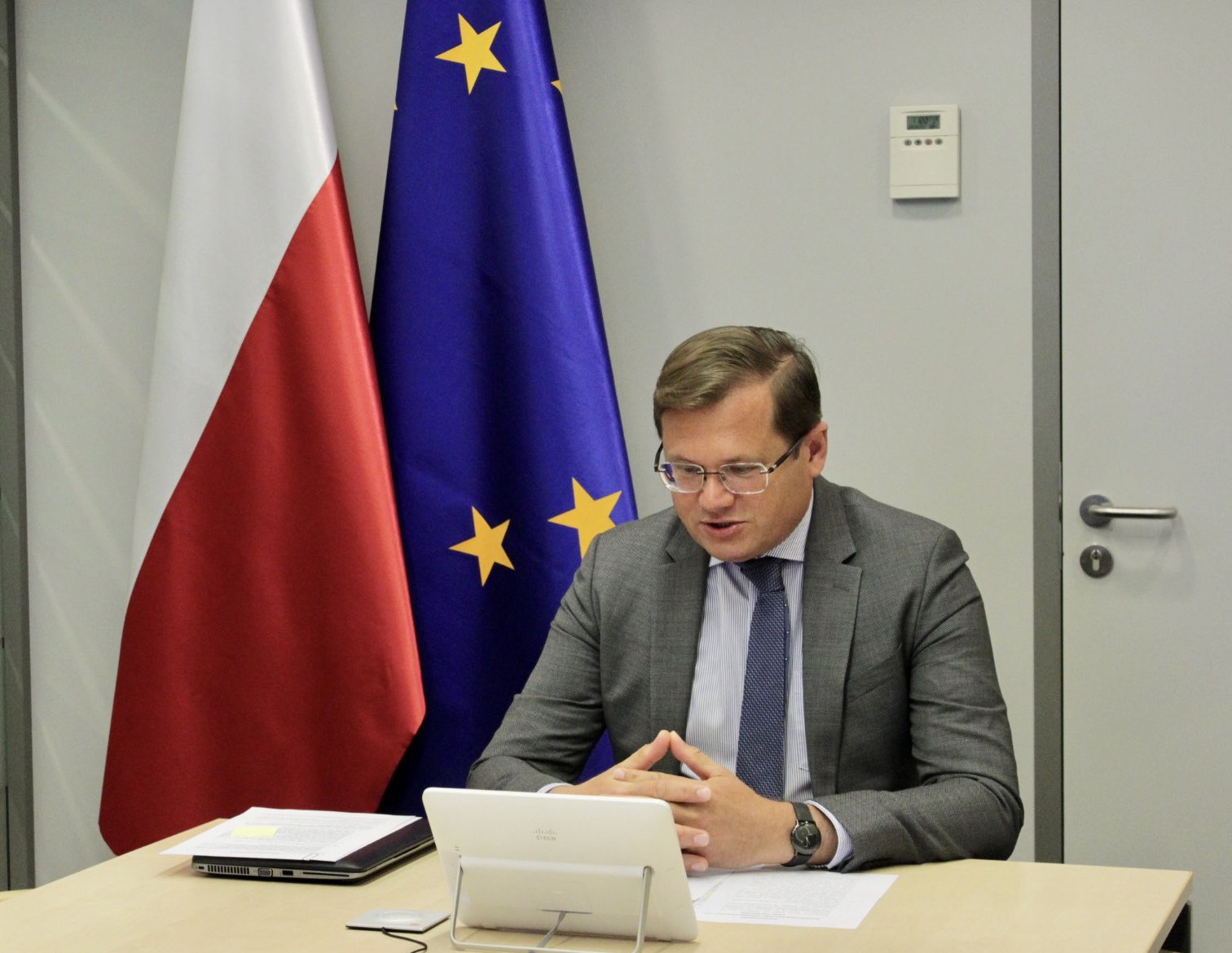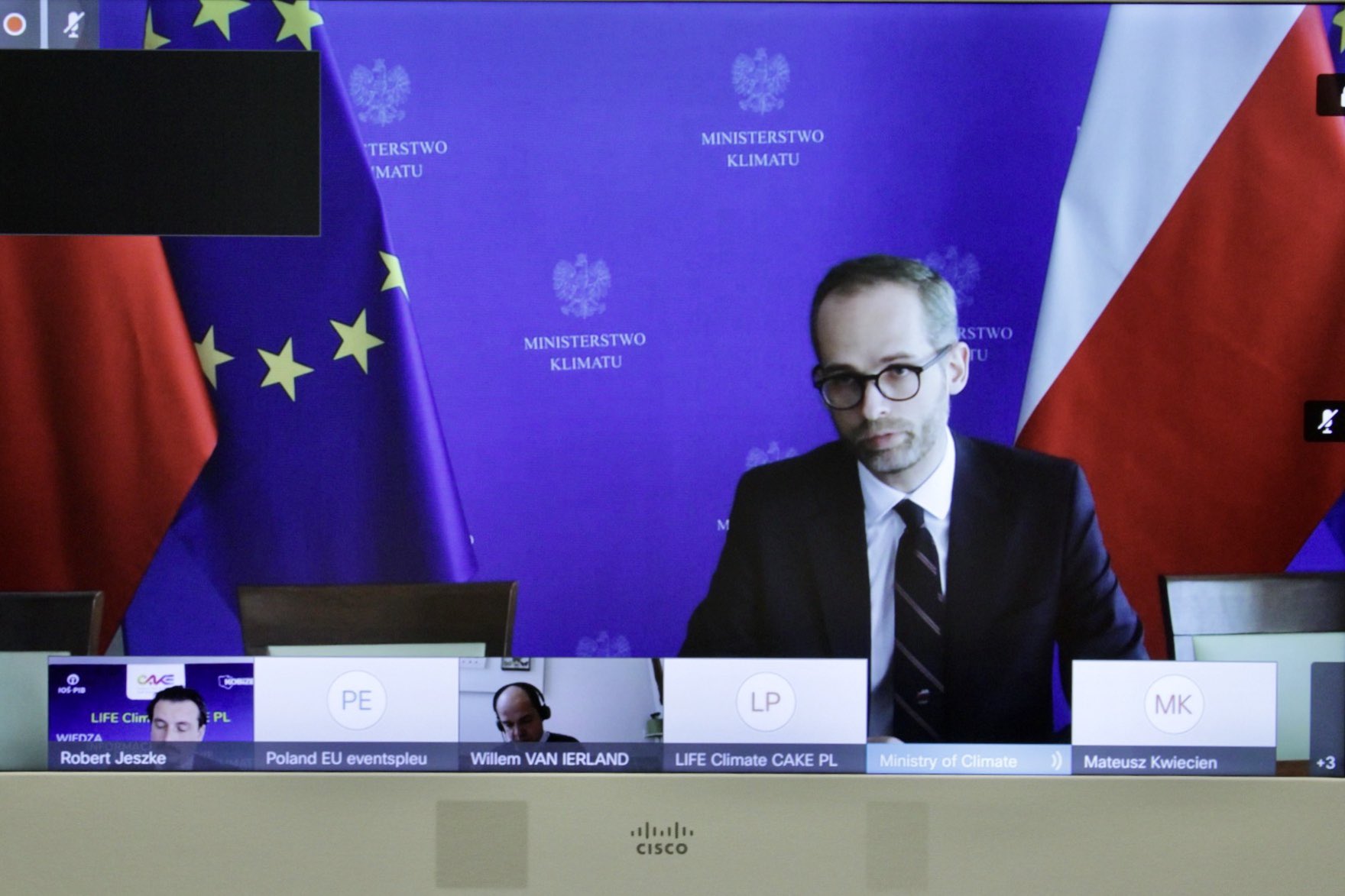"European Green Deal 2050 - Challenges of Transformation" - webinar
12.05.2020
The Permanent Representation of the Republic of Poland to the EU together with the National Centre for Emissions Management (KOBiZE) organized a video conference, during which experts exchanged views on the challenges related to the transformation towards climate neutrality and the impact of the COVID-19 pandemic on the implementation of the EU's ambitious climate and energy policy.

The Permanent Representative of the Republic of Poland to the EU Andrzej Sadoś emphasized in his opening remarks that the challenges facing Poland and the European Union are unprecedented. They will require not only significant investments, but also far-reaching actions with serious consequences on behalf of a wide range of sectors. The Ambassador referred to the current economic and social situation caused by the COVID-19 crisis while stressing that the scale of the challenges means that the challenge of transformation will be even more difficult than anticipated.
Already before the pandemic, the costs of transformation were particularly high for countries such as Poland, and due to the pandemic they are expected to increase even further. Regardless of the level of socio-economic development or the structure of the energy mix, all Member States are faced with new challenges. Strengthening cooperation and building universal tools to stimulate post-crisis reconstruction has a chance to help solve some of the problems.
The need for an ambitious and solid recovery plan ensuring the sustainable and equitable development of our continent without burdening the poorest and most vulnerable citizens and regions, and that transformation should lead to a stronger, greener, crisis-proof and united EU, underlined the Undersecretary of State in the Ministry of Climate, Adam Guibourge-Czetwertyński.

The implementation of the new greenhouse gas emission reduction targets proposed in the European Green Deal and Climate Law requires an in-depth impact assessment analysis, which is additionally complicated due to the current situation caused by the COVID-19 pandemic, Mr. Maciej Pyrka (KOBiZE) pointed out when presenting the results of the analyzes carried out in as part of the LIFE Climate CAKE PL project. The findings suggest that the change in the target reduction by 2030 will result in a reduction in the supply of emission allowances in the ETS, which in turn will significantly increase their price. This will also trigger a sharpening of current reduction policies in the non-ETS sectors. The implementation of far-reaching emission reductions to 2050 will practically mean the need to reduce to zero emissions from the power sector and from some other industrial sectors. The high price of allowances can generate large production costs and lead to the phenomenon of a so-called carbon leakage.
Mr Tom van Ierland (DG CLIMA - European Commission) made it clear that raising targets by 2030 despite the current crisis caused by COVID-19 is still a priority for the EC, and the publication of the results of the impact assessment is planned for September this year. The EC representative emphasized that it will be a comprehensive analysis that will assess the possibility of extending the ETS system to the transport and construction sectors. It will also analyze the potential of all EU sectors and policies identified within the European Green Deal (e.g. industrial policy, circular economy, biodiversity, farm to fork) to achieve its goals. The analysis will also cover the role of forests and land use in absorbing emissions. The comprehensive assessment will also consider the impact of COVID-19 and take into account the social aspect, including effects on labour market and employment.
Mr. Georg Zachmann, a representative of Bruegel, drew the attention to the mechanism for adjusting prices at the borders taking into account CO2 emissions, the Energy Tax Directive or the manner of getting revenues to budgets from the auction of emission allowances.
New challenges will also be faced by most sectors of classified as non-ETS. First of all, there will be significant changes affecting the transport, agricultural and buildings sectors, as pointed out by KOBIZE representative Mr. Robert Jeszke.
The videoconference was moderated by Mrs. Aleksandra Gawlikowska-Fyk, responsible for the Power Engineering project within the Energy Forum.
Materials
LIFE Climate CAKE PL Presentation (EN)CAKE_webinar_European_Green_Deal__06052020_final_(2).pdf 1.30MB
